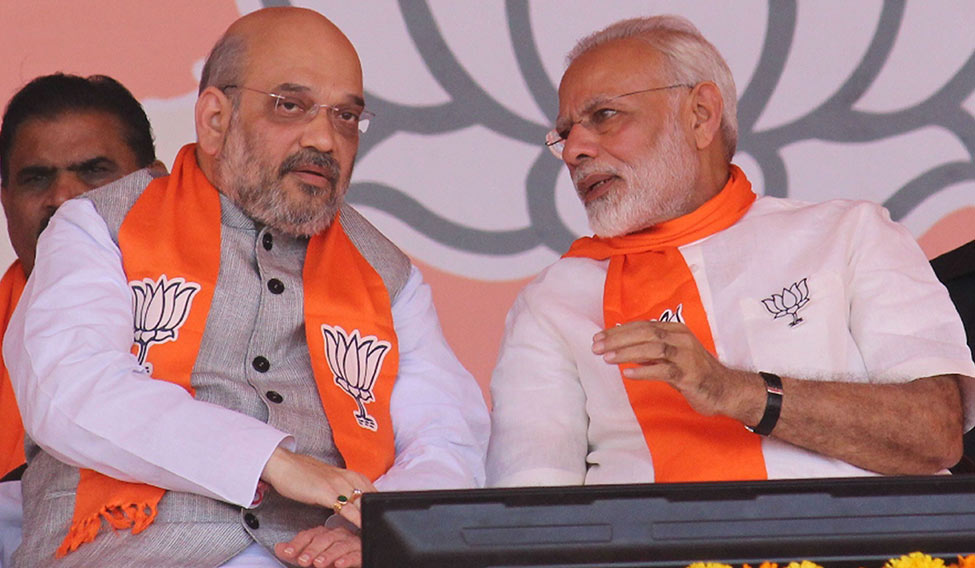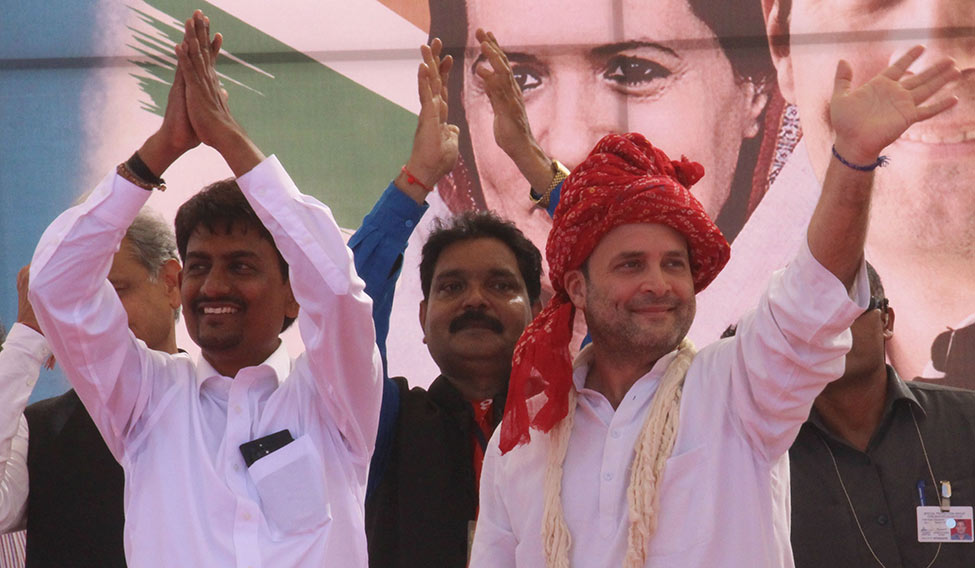Until two years ago, the outcome of this year’s assembly polls in Gujarat was a foregone conclusion. With a weakened Congress as the opposition, odds were overwhelmingly in favour of the ruling BJP.
The civic polls in December 2015, however, saw the Congress bouncing back. It won a majority of district and taluka panchayats, and increased its seat share in municipal corporations, considered to be saffron strongholds. Sensing that the BJP needed to step up its efforts, party president Amit Shah set a target for workers early this year: 150 or more seats in the 182-member assembly. He also declared that winning the elections this year by a wide margin was a matter of prestige.
But, the way things have changed in the past few months, the BJP’s hopes of achieving Shah’s target seem to be fading. With the Election Commission announcing on October 25 that the voting will be held in two phases, on December 9 and 14, the BJP is in a rush to deal with a series of challenges, even as the Congress senses an opportunity to return to power after 22 years.
A key challenge facing the BJP is the Patidar agitation demanding reservation in jobs and education. The Patels, who make up 14 per cent of the state’s population, have traditionally been BJP supporters. But Hardik Patel, whose Patidar Anamat Andolan Samiti leads the agitation, has pitched them against the party.
To make matters worse, Alpesh Thakore, who represents Other Backward Classes, has joined the Congress. Son of Congressman Khodabhai Thakore, Alpesh is spearheading the OBC agitation demanding jobs, support to farmers and stricter implementation of prohibition.
The BJP had been trying to seek Alpesh’s help to offset its anticipated loss of support among the Patels. The OBCs make up nearly 45 per cent of the population. The Thakore community, to which Alpesh belongs, alone constitutes 20 per cent. “My aim will be to ensure victory of 182 Congress candidates,” he said.
The Congress is trying to sew up an anti-BJP front on the lines of the Grand Alliance that won the assembly polls in Bihar in 2015. Thakore joined the Congress on state party president Bharatsinh Solanki’s invitation. Solanki has also sought the support of Hardik, dalit leader Jignesh Mevani, Janata Dal (United) leader Chhotubhai Vasava, the Aam Aadmi Party and the Nationalist Congress Party.
Hardik has still not openly supported the Congress. But he has been urging the community to “dethrone” the BJP. He has also been telling people to “keep in mind” 14 persons who were killed when the police clamped down on the Patidar protest rally in Ahmedabad on August 25, 2015.
The state government has been struggling to contain the fallout from having initially tried to suppress the Patidar agitation. Chief Minister Vijay Rupani announced several schemes to placate the agitators, but Hardik and his Patidar Anamat Andolan Samiti dismissed them as mere handouts.
 Prestige fight: Shah and Modi at a BJP rally at Bhat village near Ahmedabad | Janak Patel
Prestige fight: Shah and Modi at a BJP rally at Bhat village near Ahmedabad | Janak Patel
The BJP is now desperately trying to woo Patidars. Hardik’s close aides, Varun Patel and Reshma Patel, have joined the party, and are now alleging that he has vested interests. Narendra Patel, a PAAS leader from north Gujarat, quit the BJP within a day of joining it. He alleged that Varun had offered him Rs 1 crore to join the BJP, and that he had received Rs 10 lakh in advance. Nikhil Savani, PAAS leader from south Gujarat, quit the BJP a fortnight after he joined, saying Patidars were being used as a vote bank.
The Congress has been trying to woo Hardik. Though he turned down an invitation to meet Congress vice president Rahul Gandhi, Hardik held talks with Ashok Gehlot, the party’s in-charge for Gujarat on October 23. He is believed to have made three demands: reservation for Patels under the OBC category, compensation for the kin of 14 agitators killed in 2015, and a stake in the government if the Congress comes to power.
A day after the meeting, news channels aired footage, allegedly leaked by the police, showing Hardik arriving at the hotel where Gehlot was staying. Hardik and Gehlot later alleged that the state government was keeping them under surveillance.
The unrest among dalits is also a deciding factor. Even though they constitute just 7 per cent of the population, losing their support could cost the BJP several seats. The Rashtriya Dalit Adhikar Manch, led by Mevani, is campaigning for land reforms. Mevani, too, has made his anti-BJP stand clear.
For the first time in the past 15 years, the BJP is campaigning without announcing a chief minister candidate. “We are jointly fighting the elections,” BJP president Jitu Vaghani told THE WEEK. When it was pointed out that the BJP had, on previous occasions, criticised the Congress for not announcing its CM candidate, Vaghani replied that it was the lotus, the BJP’s poll symbol, that was important. But, when asked repeatedly about the party’s choice, he said, “Rupani is the CM candidate.”
The rise in the number of ticket aspirants is a challenge. A dozen Congress legislators had joined the BJP in the run-up to the Rajya Sabha polls in August. But giving tickets to all of them would mean letting longtime leaders down.
“The party is also facing a problem of overdoing things,” said a BJP leader, who is part of the state unit’s think-tank. “After Shah’s meeting in March, there has been some programme or the other every fortnight. The worker is actually tired.”
The BJP had organised a mega rally in Gandhinagar on October 16, which Modi and Shah jointly addressed. The BJP had said that the rally would be attended by “page presidents”, persons in charge of each page of the electoral roll. But the attendees were largely from villages and tribal areas. Middle and upper class voters, who make up the party’s base, were absent.
“Who will come two days ahead of Diwali?” asked a BJP leader in Ahmedabad. “Small traders are already disappointed because of the Goods and Services Tax. Before GST, they were hit by demonetisation.”
Jaylal, president of the Surat Vividh Vyapari Mahamandal, a federation of more than 30 trade associations, said textile traders were especially unhappy. “Several traders have stopped dealing with small traders, as failure on the latter’s part to file GST will be considered the big trader’s liability,” he said.
Rahul Gandhi’s criticism of GST—he called it Gabbar Singh Tax at a rally in Gandhinagar on October 23—appears to have struck a chord with the public. His speeches have touched on issues that matter a lot to businesspeople.
The BJP is also battling the viral Congress campaign mocking Gujarat’s development—“Vikas gando thayo che [development has gone berserk]”. The BJP had organised a 15-day Gujarat Gaurav Yatra, raising the slogan Hun chu vikas, hun chu Gujarat (I am development, I am Gujarat), in response to the Congress campaign. But it did not succeed. In fact, at several places, the yatra was greeted with protests.
“It is a big test for the BJP,” said Vishnu Pandya, a political analyst in Ahmedabad. “The situation is different from earlier times.” Pandya, however, said the BJP had one advantage: It has workers even at the booth level, which the Congress does not have.








